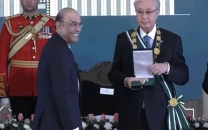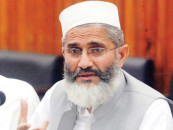Identifying issues: Underlining problems in education and HEC
Mukhtar Ahmad addresses crucial questions regarding the commission at Express forum.

Underlining problems in education and HEC. PHOTO: FILE
The government should address delays in disbursement of funds while increasing allocations for the education sector relative to gross domestic product to foster an efficient and dynamic knowledge economy for the country. These were the predominant themes at the Express forum, conducted here on Tuesday.
“The government also needs to lift the federal level recruitment ban to address the shortage of academia and other staff. I have also written to the ministry of education about this,” stated Higher Education Commission (HEC) Executive Director Dr Mukhtar Ahmad.
Charting his own progression from his early education to his professional career, Ahmad said that initiatives such as starting a business school at Quaid-e-Azam University and the establishment of COMSATS Wah campus were both his ideas.
“The crisis at HEC compelled me to come to Pakistan from Morocco. I could not see political wrangling at such a prestigious education institution of the country,” he recalled.
He admitted that some mistakes were committed which politicised the role of HEC, deviating from the trajectory of academic work and research.

“One of these mistakes was when HEC officials began leaking the names of fake degree holders in parliament to the media,” said Ahmad, adding that this got the HEC caught in the crossfire between the Election Commission and politicians.
The HEC’s job was only to verify degrees and return them to the concerned departments, he said. “Giving out names was unprofessional and led to indirect attacks on the top education commission, clipping its power,” he added.
He announced that the HEC was enhancing academia-industry linkages by inviting chamber of commerce employees and researchers to brainstorm and understand the dynamics and demands of the contemporary market, reaching a consensus for an agreeable way out.
When asked about the funding issues faced by universities, he delineated several causes for this emerging problem, including the overarching economic crunch in the country, an overall cut of 30 per cent in the annual budget of 2012-13, and issues of governance at varsities.
He pleaded to the government that cuts on matters pertaining to education should be avoided and urged them for the timely release of funds, as thousands of students and scholars were at stake.
“Universities also need to work on their governance, as problems here resulted not only in a wastage of money, but also put varsities in crises, making them unable to pay day-to-day expenses and staff salaries,” he commented.
Published in The Express Tribune, January 22nd, 2014.



















COMMENTS
Comments are moderated and generally will be posted if they are on-topic and not abusive.
For more information, please see our Comments FAQ